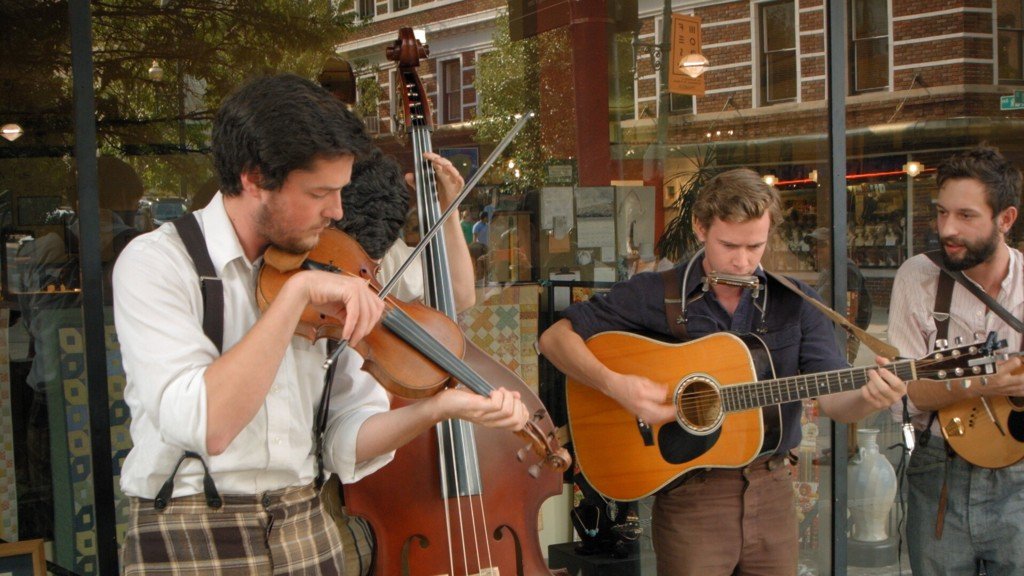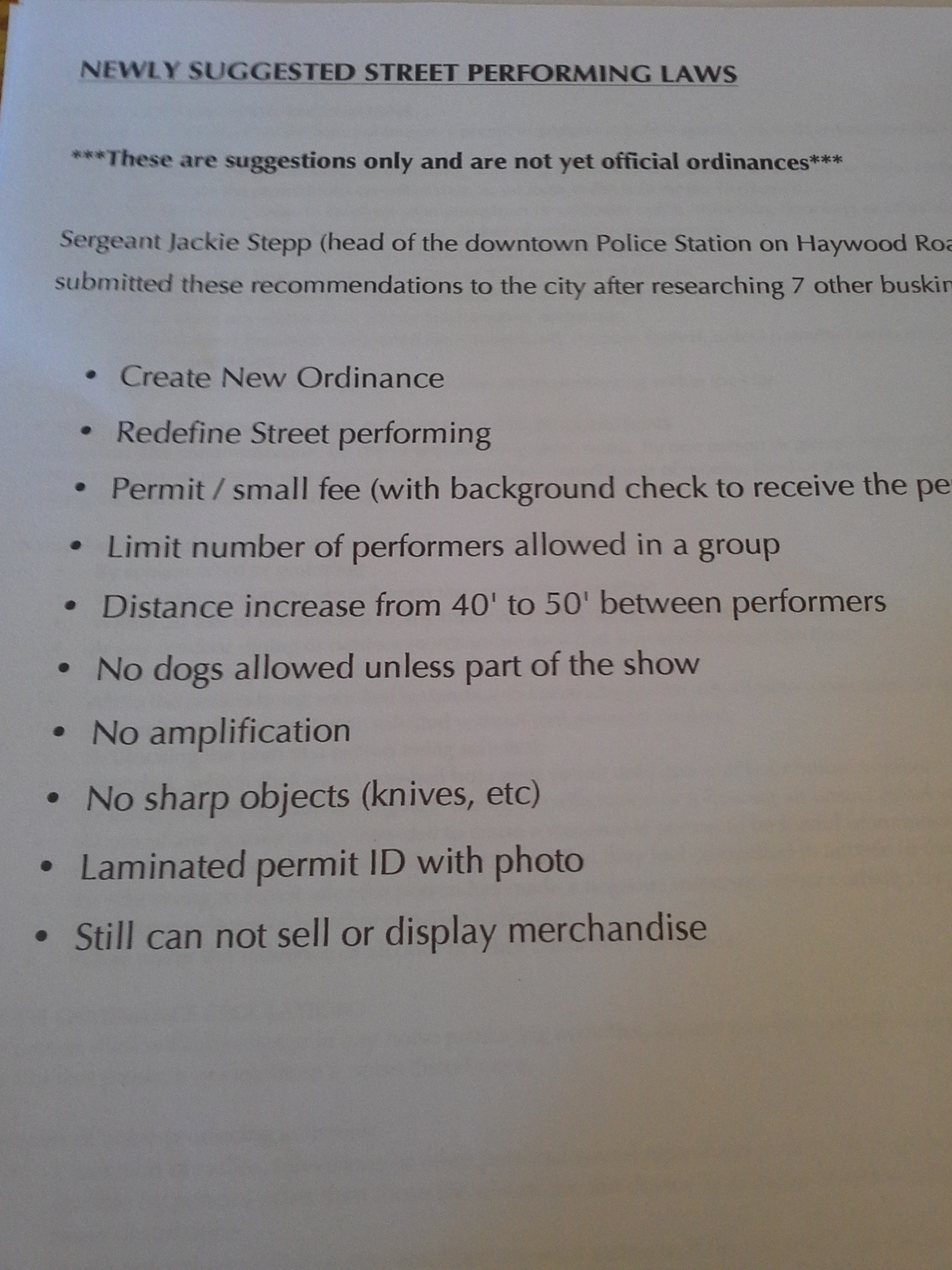


With new restrictions possible, Asheville’s buskers become the latest flashpoint in the debate over the future of downtown and its culture.
Above: The Stillwater Hobos performing in a still from Erin Derham’s documentary Buskin Blues. The movie delves into Asheville’s busking culture at a time when the city’s considering changing its rules for street performers.
The room at Rosetta’s was packed with around 50 people during lunchtime this past Wednesday. The crowd included singers, tarot readers, jugglers, performers, artists and musicians of almost every conceivable stripe. All of them form part of Asheville’s busking community.
They were there because of concerns about possible regulations that could restrict their livelihood. On Monday, Asheville City Council’s Public Safety Committee will consider the rules on busking. By this afternoon, a petition calling instead for “pro-busker rights reform” had gained over 1,200 signatures.
While there’s been no formal proposal or recommendations yet, a sheet handed out to the assembled buskers detailed a series of proposals suggested by downtown police unit commander Sgt. Jackie Stepp, drawn from policies on busking in seven other unspecified cities. These included a requirement for paid permits with background checks, an increase in the distance between performers, along with a ban on dogs (unless part of the performance) and knives.

A handout of changes to Asheville’s busking rules suggested by APD Sgt. Stepp, distributed at a Sept. 17 meeting of local buskers.
Activist Robert Zachery, one of the organizers of the meeting, said he felt that it was a good idea to assemble and discuss the issue before the city started putting new policies into writing.
“Before any decisions are made about busking, we should make it clear that we have enough brainpower and heartpower in this room to make those decisions ourselves,” he said. “The more we work together, the more the city will work with us.”
“I believe we can govern ourselves as street performers,” Zachery added. “What we don’t want is interference to where we can’t do it. We’ve got too many doggone laws in this country in the first place.”
While there were calls for dialogue, the possibility of permits and regulation on what many of them asserted is both livelihood and free speech drew fierce opposition from some in the room. The list of Stepp’s suggestions mostly drew responses of “ridiculous” and some sharp criticism.
Abby the Spoon Lady asked for a show of hands from the assembled buskers as to how many of them absolutely opposed assigned spots or paid permitting. Nearly every hand shot up immediately.
“I’m not ok with those,” she said.
However, Jessica Tomasin, founder of Asheville Music Professionals, said that she’d spoken extensively with Jon Fillman, the economic development staffer who oversees busking for the city, and that many on city staff have no desire to regulate busking beyond a few particular concerns.
“While this may be proposed from [Stepp] I can tell you that the city doesn’t want to do permitting,” Tomasin said. “They don’t want to regulate this any more than they have to. For them, their concerns are that their have to be some guidelines as to what a street performance actually is.”
She praised Fillman and said she’s worked with him on public events before.
Clearer rules around amplification and what local businesses can do if they have a problem with a busker are another focus of the city, Tomasin noted.
“Does that business owner have any recourse to deal with someone who’s singing badly or singing out of tune?” she asked.
“No, it’s the street, you can do what you want,” musician Michael Moravetz replied. He later added, “the thing for me is nearly zero regulation. When you start regulating this, that’s when the downfall begins.”
“If Asheville becomes a place where this is a pain in the ass, we’re going to lose a huge part of our culture.”
Sadie, a busker who performs with the group the Carolina Catskins, started the petition, and said there’s a fundamental problem with the way city government views buskers, namely that they’re often lumped in with panhandling and solicitation, such as in the city’s brochure for entertainers.
“We need to be pro-busker. We need to stop being treated as criminals. We’re entertainers. I think that’s one of the main things we all need to get behind.”
She suggested the idea of a buskers union to better organize and represent the concerns of all buskers, including those that aren’t musicians.
“I’d like to see buskers fighting for their own rights,” she added. “We’re not treated as humans.” Some of the other buskers applauded at her remarks.
Generally, she added, buskers are relatively happy with the current rules, except the prohibition on allowing them to directly ask for tips or sell CDs.
Some of the issues, like amplification, aren’t simple some of the buskers said. Musician Peter Levitov noted that he uses amplification, but is often not as loud as some other un-amplified musicians due to the style of music he plays, and he added that improving technology has meant that laws around amplification have lagged behind “21st-century busking.”
Some of the buskers wondered why the APD couldn’t use decibel meters or rely on the city’s current noise ordinances to take care of the issue.
Sparrow Pants, who performs as part of the Resonant Rogues and has busked in the city for over a decade, wanted “the least painful regulation” and found it ironic that city officials are considering regulating a successful part of the culture the city is widely known for.
“I’ve grown up in this subculture,” she said. “It needs to be shown to the community that this is incredibly important. My picture was on the tourist brochure for years. This is a city where it’s an extremely important part of the culture.”
She did note that she’d been to some cities where the regulations were extremely burdensome, and “if I had to do that in Asheville, I wouldn’t busk here.”
Reviewing options
Busking is a major part of downtown’s culture, and coincidentally, the same week that saw discussion about the issue and possible regulation heat up also sees the premiere of the Buskin Blues documentary, about the city’s busking scene.
Changes in city policy, for good or ill, spend a long time being discussed before they come up for a vote in Council’s chambers or often before they even hit the public eye. So what led to city staff taking a look at this issue?
The Asheville Police Department rolled out a downtown “enhancement” plan earlier this year. However, when asked late last month where the city stood on the issue, the reply from city spokesperson Dawa Hitch just noted that the city was analyzing police’s role in dealing with buskers.
Reached by the Asheville Blade about this latest round of discussions last week, Fillman declined to comment and deferred to Hitch.
“I’d like to underscore this is the beginning of a conversation,” Hitch wrote when asked about the issue. “There seems to be misinformation circulating that there is an official course of action being recommended. This is not true. There will be a presentation to the Public Safety Committee on Monday in which policy options for management of public space in the Central Business District [the city’s official name for downtown] will be discussed.
Nonetheless, while city staff claimed that the conversation is just beginning, it does look like some options for rule changes have already been researched. Asked about Stepp’s list of suggested regulations, and why city staff are taking a look at changing busking rules now (i.e. if they’ve received a larger number of complaints than usual), Hitch replied that “it is not unusual for high performing city staff (to include APD officers) to look for solutions to feedback they get from the community. My understanding is that, over the summer months, panhandling, street performers/sidewalk vendors and public space/private easements were often discussed at community and business meetings.”
At the meeting, Hitch said, the public can expect staff to review the current rules, “benchmarking” (city staff jargon for reviewing how policies work and compare to those of other cities), and possible actions.
What actions, and what complaints might have led to them, she did not specify.
“Should the Public Safety Committee give direction that they would like staff to further research the subjects and policy options in the areas of panhandling, street performers/sidewalk vendors, public space/private easements, I am sure any preliminary information staff has gathered will be considered,” Hitch continued. “I would like to note any future recommendations would also reflect insight gained from public input.”
The larger view
This isn’t the first time city government’s ended up in the middle of a controversy regard the regulation of downtown, especially in response to complaints from business owners or residents.
In 2012, some of downtown’s power brokers and business owners tried to form a Business Improvement District, a non-profit funded by a special city tax that would have had broad powers to deal with downtown security and cleanliness. The proposal drew wide and fierce opposition with worries about the tax burden and the fear that it was putting too much power over the area into the hands of a board that reserved some seats specifically for wealthy landowners. The project floundered when Council declined to give the BID the tax they requested.
Then, too, some opponents worried that the BID would crush any part of downtown culture that its wealthier denizens might dislike.
Also in 2012, the Downtown Association, along with some business owners and members of the Downtown Commission, pushed to regulate newspaper boxes, declaring that they were often an unsightly nuisance. However, such regulations are hard to craft without running up against constitutional protections for freedom of the press and multiple U.S. Supreme Court rulings. Then, the effort ended with a promise to communicate with newspaper publishers and deal with problems informally.
Late last year, some boxes were stolen off the streets, only to later be found in an abandoned parking garage. The culprits were never found, and at a meeting discussing the missing boxes, some commission members questioned if newspapers had the right to be on the street at all without paying for a permit.
At the time, an attorney for the North Carolina Press Association condemned the commission members’ interpretation of the law as “absurd” and noted that attempts to regulate newspaper boxes around the country have been struck down if they just seek to do so merely on beautification grounds.
Now, it’s buskers turn to be part of the ongoing battles about downtown’s culture and the potential larger issues attempts to regulate it raise.
Cities that have pursued regulations on buskers have sometimes found themselves in the middle of a lawsuit. That’s because it’s difficult to regulate people performing on a public street without running into potential conflicts the First Amendment’s protections on freedom of speech. The American Civil Liberties Union, for example, has fought multiple lawsuits against busking ordinances around the country on the grounds they violate performers’ constitutional rights.
At the same time, there are other constituencies in downtown complaining about this issue, while many buskers assert they form a vital part of the city’s culture for both locals and visitors.
Tomorrow, at 3:30 p.m., the Public Safety Committee will meet in the municipal building to discuss the issue. The debate about how downtown should be governed, and for whom, will continue.
—
The Asheville Blade is entirely funded by its readers. If you like our work, support us directly on Patreon. Questions? Comments? Email us.